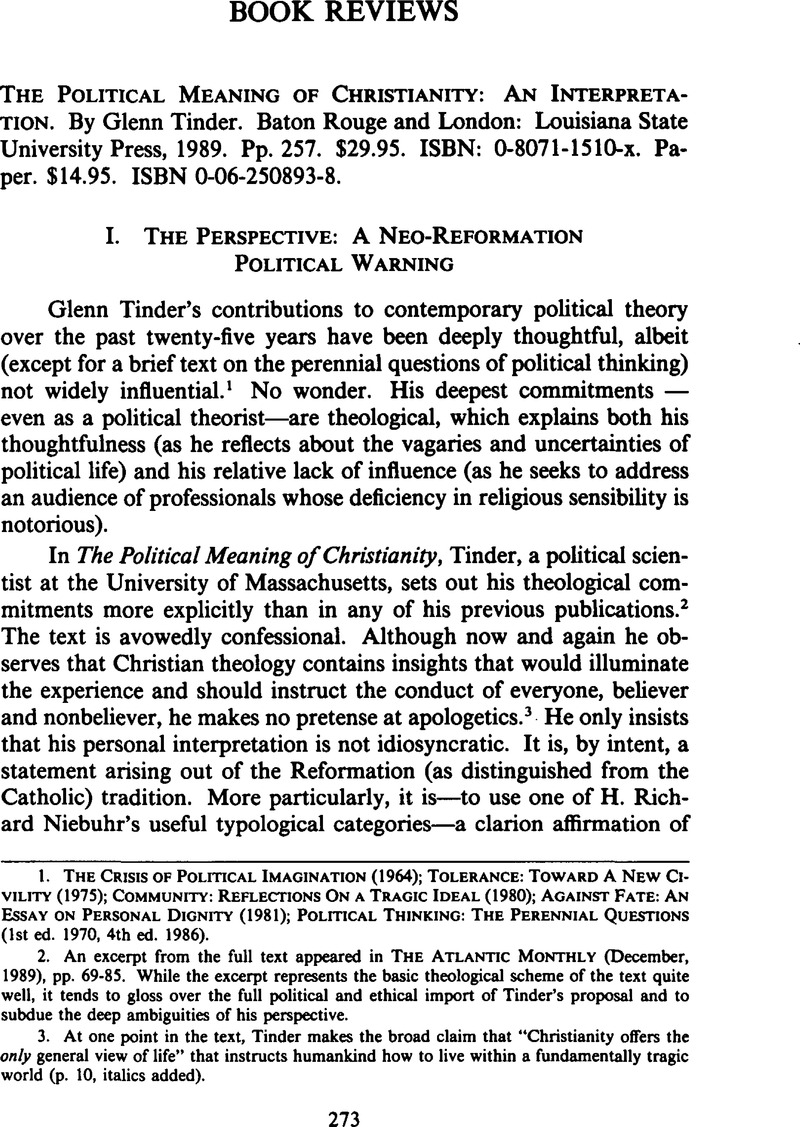No CrossRef data available.
Published online by Cambridge University Press: 24 April 2015

1. The Crisis of Political Imagination (1964); Tolerance: Toward A New Civility (1975); Community: Reflections On a Tragic Ideal (1980); Against Fate: An Essay on Personal Dignity (1981); Political Thinking: The Perennial Questions (1st ed. 1970, 4th ed. 1986)Google Scholar.
2. An excerpt from the full text appeared in The Atlantic Monthly (December, 1989), pp. 69-85. While the excerpt represents the basic theological scheme of the text quite well, it tends to gloss over the full political and ethical import of Tinder's proposal and to subdue the deep ambiguities of his perspective.
3. At one point in the text, Tinder makes the broad claim that “Christianity offers the only general view of life” that instructs humankind how to live within a fundamentally tragic world (p. 10, italics added).
4. Niebuhr, H. R., Christ and Culture (1952)Google Scholar.
5. Conceptually, Tinder, in keeping with much modern Protestant Christian theology, seems to filter the Augustinian-Lutheran theological tradition through the thought forms of Kantian philosophy. See, e.g., Political Thinking (3rd ed. 1974), the epilogueGoogle Scholar.
6. Yet, Tinder's explicit judgment that “Christianity in essence is not conservative” (p. 153) must be noted. But in the context, what Tinder means is that, unlike ordinary conservatism, Christianity does not allow one to revere any inherited institutional forms, however ancient or long-standing.
7. See, e.g., Ferdinand Tönnies pioneering work, Gemeinschaft und Gesellschaft (1888).
8. Tinder, incidentally, directly refers in his text to only one contemporary theologian, David Tracy, and then he does so to dismiss him. Tinder refers to “liberation theology” only as a category. He does not refer to any particular proponent of that movement and he makes no mention of any of the particular persons engaged in feminist or African American theological reflection.
9. A euphemism for “elitism”?
10. Hence, for instance, the control of mass media and popular culture over minds and conduct of the populace.
11. Tinder's scattered references to the movements of the sixties (e.g., pp. 57, 135) are all of a negative character. Civil disobedience and methods of nonviolent change suffer, in Tinder's judgment, from the same ambiguities of all institutional forms and, in general, are to be avoided.
12. Tinder's “otherworldliness,” which flows directly from his theological anthropology, has another consequence evidenced in the utter absence of any discussion of environmental concerns in his text. This is a point at which, for instance, the political theology of a Jürgen Moltmann and the process theology of a John Cobb demonstrate a keener sensitivity to the full breadth of political concerns now confronting us than does Tinder's neo-Reformation/neo-Kantian theology.
13. A transformative theology, it should be noted, is not necessarily incompatible with deep appreciation for the tragic sense of life. Alfred North Whitehead, for instance, concludes his Adventures of Ideas (1952) with the suggestive affirmation that:
At the heart of the nature of things, there are always the dream of youth and the harvest of tragedy. The Adventure of the Universe starts with the dream and reaps tragic Beauty. This is the secret of the union of Zest with Peace:—That the suffering attains its end in a Harmony of Harmonies. The immediate experience of this Final Fact, with its union of Youth and Tragedy, is the sense of Peace. In this way the World receives its persuasion towards such perfections as are possible for its diverse individual occasions (p. 381).